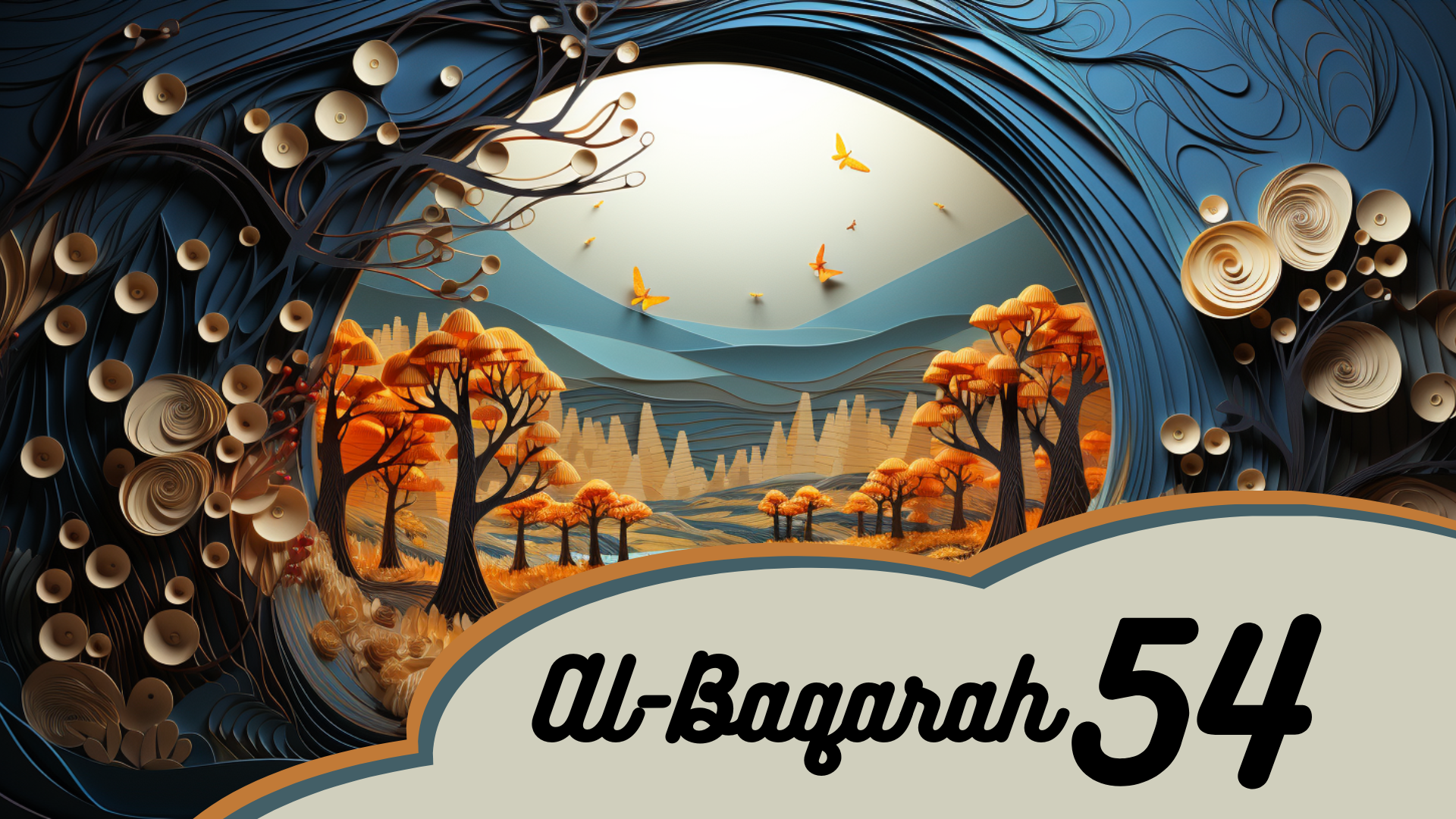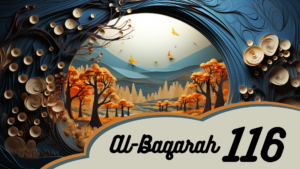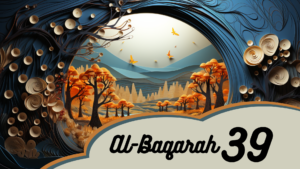In this article, we explore the profound meaning behind Verse 54 of Surah Al-Baqarah. With a detailed analysis of each word and its significance, we uncover the deeper message and its relevance to the daily lives of Muslims. This verse holds immense wisdom and guidance, revealing a profound truth that resonates with believers today. Through this exploration, we aim to shed light on the rich spiritual teachings embedded within the Quran, providing a deeper understanding of this particular verse and its practical application in our lives.
Verse 54 of Surah Al-Baqarah
Context of Surah Al-Baqarah
Surah Al-Baqarah is the second chapter of the Quran and is the longest chapter in terms of the number of verses. It was revealed in Medina and covers a variety of topics including laws, regulations, stories of prophets, and guidance for believers. The chapter is highly revered and is often regarded as one of the most comprehensive and important chapters in the Quran.
Understanding the Verse
The 54th verse of Surah Al-Baqarah states, “And [recall] when Moses said to his people, ‘O my people, indeed you have wronged yourselves by taking the calf [for worship]. So repent to your Creator and kill yourselves. That is best for [all of] you in the sight of your Creator.’ Then He accepted your repentance; indeed, He is the Accepting of repentance, the Merciful.”
This verse refers to the incident in which the Israelites, while Moses (peace be upon him) was away, worshipped a golden calf instead of Allah. Moses, upon his return, admonished his people and instructed them to repent and punish themselves for their disobedience. Allah, being Merciful and Forgiving, accepted their repentance.
Command to Worship the Golden Calf
The events leading up to the worship of the golden calf can be traced back to the time when the Israelites were led out of Egypt by Moses, after being enslaved for generations. Moses was summoned to Mount Sinai to receive the commandments from Allah, leaving his people under the care of his brother, Aaron. During Moses’ absence, the Israelites became impatient and turned to idolatry.
They began worshipping a golden calf, a symbol of the gods they had seen while being influenced by the polytheistic culture of the Egyptians. This act was a grave sin and a betrayal of the covenant they had made with Allah. The command to worship the golden calf was a deviation from the path of monotheism and a direct violation of the first commandment, which is to worship Allah alone.
The Punishment of the Israelites
Upon his return, Moses was horrified to witness his people indulging in idol worship. In response to their disobedience, he smashed the tablets of the Ten Commandments and felt profound anger towards his people. The punishment for their transgression was severe, as it reflected the seriousness of their act. The manifestation of divine wrath led to the destruction of the idol and the subsequent punishment of those involved.
Moses, out of his righteous anger, scolded and admonished his people. He called them to repent and instructed them to kill themselves as an act of severe penance. This was a symbolic punishment to emphasize the gravity of their sin and to purify their souls. Upon witnessing their remorse and sincere repentance, Allah forgave the Israelites and accepted their repentance, demonstrating His infinite mercy and compassion.
Lessons for Muslims Today
The incident of the golden calf holds significant lessons for Muslims today. It serves as a reminder of the dangers of idolatry and the consequences of disobedience to Allah. As Muslims, it is crucial to adhere to the principles of tawheed (monotheism) and to worship Allah alone. Associating partners with Allah, known as shirk, is a grave sin and leads to spiritual and moral degradation.
It is essential for Muslims to learn from the mistakes of the Israelites and avoid falling into the trap of idolatry or any form of shirk. Worship should be directed solely towards Allah, placing Him above all worldly desires and attachments. This incident also underscores the significance of repentance, as Allah is the Accepting of repentance, ready to forgive those who turn back to Him with sincere remorse.
In addition, the story of the golden calf demonstrates the importance of self-discipline and accountability. Deviating from the path of righteousness has its consequences, and it is incumbent upon Muslims to strive for piety and righteousness in all aspects of life. The incident serves as a reminder to remain steadfast in faith and to resist the temptation to stray from the path ordained by Allah.
Introduction to Surah Al-Baqarah
Position in the Quran
Surah Al-Baqarah is the second chapter of the Quran and is positioned after Surah Al-Fatiha, the opening chapter. It carries significant weight in terms of its length and depth of content, making it a central chapter in the Quran.
Length and Structure
Surah Al-Baqarah consists of 286 verses and is the longest chapter in the Quran. Its length allows for a comprehensive examination of various aspects of faith, guidance, and practical matters related to the lives of Muslims. The chapter is divided into distinct sections, addressing different themes and topics.
Connection to Surah Al-Fatiha
Surah Al-Baqarah follows Surah Al-Fatiha, the opening chapter of the Quran, and establishes a deeper understanding of the core principles introduced in Al-Fatiha. It expands upon the themes of guidance, worship, and recognition of the oneness of Allah.
Revelation and Placement
Makkan and Madinan Verses
Surah Al-Baqarah encompasses both Makkan and Madinan verses. The chapter was revealed over a period of approximately nine years, with the Makkan verses primarily addressing matters of faith, while the Madinan verses focus more extensively on the establishment of a societal framework for Muslims.
Chronological Order
The verses of Surah Al-Baqarah are not arranged in chronological order. Instead, they are arranged thematically, allowing for a comprehensive exploration of different aspects of faith, guidance, and practical matters.
Audience and Context
The initial audience for Surah Al-Baqarah consisted primarily of the early Muslim converts in Mecca and Medina. However, the lessons and guidance within the chapter transcend time and place, holding relevance for Muslims of all generations. The context of the chapter reflects the challenges faced by the early Muslim community, providing guidance and support in navigating various aspects of life.
Themes and Topics Covered
Guidance for Believers
Surah Al-Baqarah offers comprehensive guidance for believers, covering a wide range of topics, including beliefs, worship, ethics, and social issues. It emphasizes the importance of faith, righteous deeds, and steadfastness in the face of trials and tribulations. The chapter focuses on nurturing a strong connection with Allah and adhering to the principles of Islam.
Stories of Prophets and Israelites
Surah Al-Baqarah contains numerous stories of the prophets, such as Adam, Noah, Abraham, Moses, and Jesus (peace be upon them). These stories provide valuable insights into the lives of these righteous individuals, their struggles, and their unwavering faith in Allah. The stories also serve as lessons and examples for Muslims to follow.
Laws and Regulations
Surah Al-Baqarah addresses various legal and regulatory matters, encompassing topics such as marriage, divorce, inheritance, dietary laws, and financial transactions. These laws and regulations provide a comprehensive guide for Muslims in their personal and societal affairs, promoting justice, fairness, and ethical conduct.
The Importance of Tawheed
Oneness of Allah
Tawheed is the central concept in Islam, emphasizing the oneness and uniqueness of Allah. It is the foundation of Islamic belief, encapsulating the idea that there is no deity worthy of worship except Allah. Surah Al-Baqarah reinforces this fundamental principle and warns against associating partners with Allah or engaging in idolatry.
Worshiping Allah Alone
One of the key lessons from Surah Al-Baqarah is the importance of directing our worship solely towards Allah. The incident of the golden calf serves as a stark reminder of the dangers of idolatry and the severe consequences of deviating from the path of monotheism. Muslims are called upon to purify their hearts, minds, and actions, dedicating their worship exclusively to Allah.
Avoiding Shirk
Shirk, or associating partners with Allah, is considered a cardinal sin in Islam. Surah Al-Baqarah highlights the detrimental effects of shirk and emphasizes the need to avoid any form of polytheism. By recognizing the power and sovereignty of Allah alone, Muslims are reminded of the importance of maintaining a strong belief in tawheed and abstaining from any act that compromises their faith.
In conclusion, verse 54 of Surah Al-Baqarah holds profound significance in reminding Muslims of the dangers of idolatry, the consequences of disobedience, and the importance of tawheed. The story of the golden calf serves as a powerful lesson for Muslims, encapsulating the need to worship Allah alone, repent for our sins, and stay steadfast in faith. Surah Al-Baqarah, as a whole, provides comprehensive guidance and addresses various aspects of faith and practical matters for believers. By studying and reflecting upon the lessons within the chapter, Muslims can strive to lead a righteous and fulfilling life in accordance with the teachings of Islam.




